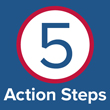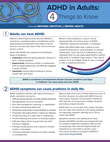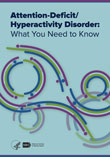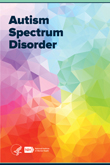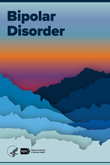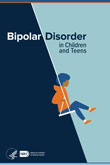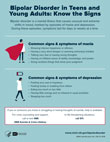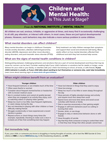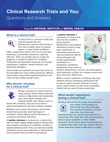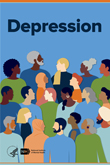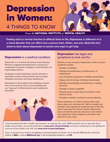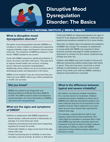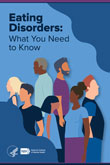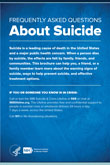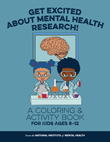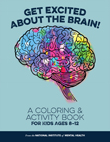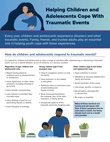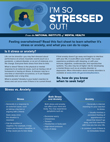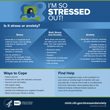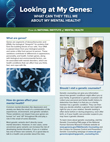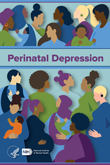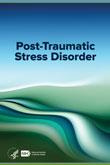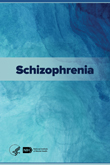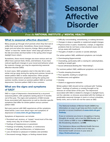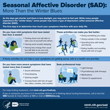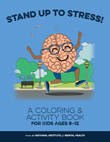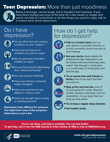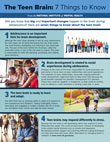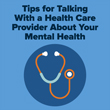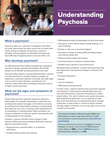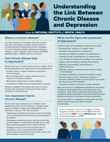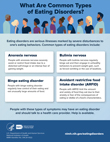Brochures and Fact Sheets in English
- 5 Action Steps to Help Someone Having Thoughts of Suicide
-
This fact sheet presents five steps for helping someone having thoughts of suicide: Ask, Be There, Help Keep Them Safe, Help Them Connect, and Follow Up.
- ADHD in Adults: 4 Things to Know
-
Information about attention-deficit/hyperactivity disorder (ADHD) in adults including symptoms, diagnosis, treatment options, and resources to find help.
- Attention-Deficit/Hyperactivity Disorder: What You Need to Know
-
Information about symptoms, diagnosis, treatment, and resources for children, teens, and adults with attention-deficit/hyperactivity disorder (ADHD).
- Autism Spectrum Disorder
-
Describes autism spectrum disorder (ASD): signs and symptoms; causes and risk factors; diagnosis in children, teens, and adults; and treatments.
- Bipolar Disorder
-
Information on bipolar disorder including symptoms, causes, diagnosis, treatment options, and resources to find help for yourself or others.
- Bipolar Disorder in Children and Teens
-
Information about bipolar disorder in children and teens including causes, signs and symptoms, diagnosis, treatment options, and how to help.
- Bipolar Disorder in Teens and Young Adults: Know the Signs
-
This infographic presents common signs and symptoms of bipolar disorder in teens and young adults.
- Borderline Personality Disorder
-
Information about borderline personality disorder, including signs and symptoms, diagnosis, and treatments for borderline personality disorder.
- Children and Mental Health: Is This Just a Stage?
-
Information on children’s mental health including behavioral assessments, when to seek help, treatment, and guidance on working with your child’s school.
- Clinical Research Trials and You: Questions and Answers
-
Learn about what a clinical trial is, potential risks and benefits, safety and ethical guidelines, and what people might experience during a clinical trial.
- Depression
-
Information about depression including the different types of depression, signs and symptoms, diagnosis, treatment options, and how to find help.
- Depression in Women: 4 Things to Know
-
Information about depression in women including signs and symptoms, types of depression unique to women, treatment options, and how to find help.
- Disruptive Mood Dysregulation Disorder: The Basics
-
Information about disruptive mood dysregulation disorder, including a what it is, signs and symptoms, diagnosis, treatment, and tips for parents and caregivers.
- Eating Disorders: What You Need to Know
-
Information about eating disorders including risk factors, types of eating disorders, symptoms, treatment, and how to find help for yourself or someone else.
- Frequently Asked Questions About Suicide
-
Information about suicide risk factors, warning signs, treatments, therapies, how to find help for yourself or others, and research about suicide prevention.
- Generalized Anxiety Disorder: What You Need to Know
-
Information about generalized anxiety disorder including common signs and symptoms, treatment options, and how to find help.
- Get Excited About Mental Health Research!
-
This printable coloring and activity book for children ages 8-12 has information about mental health research and paths to becoming a mental health researcher.
- Get Excited About the Brain!
-
This free science education activity book helps kids ages 8-12 learn facts about the brain with coloring and puzzles about brain science and research.
- Getting Mental Health Support Virtually
-
Information about telehealth for mental health services, including potential benefits and drawbacks and factors to consider when looking for a provider.
- Helping Children and Adolescents Cope With Traumatic Events
-
This fact sheet presents information on how children and adolescents respond to traumatic events, and what family, friends, and trusted adults can do to help.
- I’m So Stressed Out! Fact Sheet
-
This fact sheet is intended for teens and young adults and presents information about stress, anxiety, and ways to cope when feeling overwhelmed.
- I’m So Stressed Out! Infographic
-
A brief social media graphic about stress, anxiety, and ways to cope when feeling overwhelmed.
- Let’s Talk About Eating Disorders
-
This infographic presents facts that can help shape conversations around eating disorders.
- Looking at My Genes: What Can They Tell Me About My Mental Health?
-
This fact sheet provides information on how you can look at your family health history and your genes to determine your risk of developing a mental disorder.
- My Mental Health: Do I Need Help?
-
Information about assessing your mental health and deciding if you need help. It provides examples of symptoms, self-care activities, and how to seek help.
- National Institute of Mental Health: Celebrating 75 Years
-
This booklet provides an overview of NIMH’s 75-year history, charting a timeline of key events and major research programs and public health initiatives.
- Obsessive-Compulsive Disorder: When Unwanted Thoughts or Repetitive Behaviors Take Over
-
Information on obsessive-compulsive disorder (OCD) including signs and symptoms, causes, and treatment options such as psychotherapy and medication.
- Panic Disorder: What You Need to Know
-
Information about panic disorder, including common signs and symptoms, treatment options, and how to find help.
- PANS and PANDAS: Questions and Answers
-
Information about causes, symptoms, diagnosis, and treatment of Pediatric Acute-onset Neuropsychiatric Syndrome and Pediatric Autoimmune Neuropsychiatric Disorders Associated with Streptococcal Infections.
- Perinatal Depression
-
This brochure provides information about perinatal depression including signs and symptoms, treatment options, and how you or a loved one can get help.
- Phobias and Phobia-Related Disorders
-
Information about phobias and phobia-related disorders, including causes and treatments.
- Post-Traumatic Stress Disorder
-
Information about post-traumatic stress disorder (PTSD) including what it is, who develops PTSD, symptoms, treatment options, and how to find help.
- Schizophrenia
-
This brochure provides information about schizophrenia including symptoms, causes, treatment options, and how to find help for yourself or a loved one.
- Seasonal Affective Disorder
-
Information about seasonal affective disorder (SAD), a type of depression, including signs and symptoms, how SAD is diagnosed, causes, and treatment options.
- Seasonal Affective Disorder (SAD): More Than the Winter Blues
-
This infographic provides information about how to recognize the symptoms of seasonal affective disorder (SAD) and what to do to get help.
- Social Anxiety Disorder: What You Need to Know
-
Information about social anxiety disorder, including common signs and symptoms, treatment options, and how to find help.
- Stand Up to Stress!
-
This free coloring and activity book helps kids learn simple ways to manage stress and boost their mental well-being.
- Teen Depression: More Than Just Moodiness
-
This fact sheet is intended for teens and young adults and presents information about how to recognize the symptoms of depression and how to get help.
- The Teen Brain: 7 Things to Know
-
Learn about how the teen brain grows, matures, and adapts to the world.
- Tips for Talking With a Health Care Provider About Your Mental Health
-
Five tips to help prepare and guide you on how to talk to a health care provider about your mental health and get the most out of your visit.
- Understanding Psychosis
-
This fact sheet presents information on psychosis including causes, signs and symptoms, treatment, and resources for help.
- Understanding the Link Between Chronic Disease and Depression
-
Information about the link between depression and chronic disease, including symptoms of depression and resources to find help for yourself or someone else.
- Warning Signs of Suicide
-
This infographic presents behaviors and feelings that may be warning signs that someone is thinking about suicide.
- What Are Common Types of Eating Disorders?
-
Information about eating disorders, including anorexia nervosa, binge-eating disorder, bulimia nervosa, and avoidant restrictive food intake disorder (ARFID).
